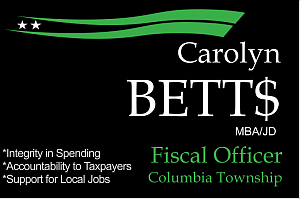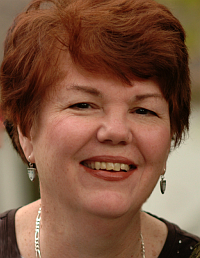Web space contributed by:
Solari, Inc., Catherine Austin Fitts, President, P.O. Box 157, Hickory Valley, TN 38042.
Paid for by Committee to Elect Carolyn Betts as Columbia Township Fiscal Officer,
Christian Betts, Treasurer,6653 Stewart Rd, Cincinnati, OH 45236
“I am happy to offer my experience and knowledge in the upcoming election for Columbia Township Fiscal Officer. Please vote in the November 8th election.”
BACKGROUND
I live on Stewart Road with my son, Christian, who is a singer, National Merit Scholarship semi-finalist and xylophone player in the Walnut Hills pit band. My family has lived in Cincinnati since at least the early 1900s, when my great-grandfather lived in North Avondale and operated a casket company. My father is a retired Episcopal priest who lives in College Hill. I am an avid spinner, weaver and knitter.
Currently, I am a self-employed attorney, practicing as part of John E. Stillpass Attorneys in Blue Ash, and part-time general counsel and journalist for my major client, Solari, Inc., and its affiliates (see, www.wordpressdevurl.com/). Before returning to Cincinnati in 2003, I was an associate and then partner of a Washington, DC law firm in the corporate finance, securities and housing finance practices. Thereafter, I joined a financial advisory company that served as the lead financial advisor for the Federal Housing Administration.
EDUCATION
Hillsdale School (now Seven Hills), 1971
Bryn Mawr College,Art History major, 1975
University of Cincinnati, MBA, Finance, 1978
Chase Law School, JD, 1984
RELEVANT WORK EXPERIENCE
- Corporate and governmental financial audits
- Public/private partnerships
- Entrepreneurship and securities offerings
- Small business management and taxation
- Fiduciary matters
- Federal budgeting (Federal Housing Admin.)
- Financial and investment advisory
- Government contracting and reengineering
- Service on non-profit boards of directors
- Lobbying for legislative change
COMMUNITY SERVICE
- Volunteer Lawyers Project, Legal Aid Society of Cincinnati –pro bono foreclosure defense attorney.
- Bible Study at Juvenile Detention Center, 2020 Auburn Avenue and volunteer for Interfaith Hospitality Network with Indian Hill
Church.
WHY I AM RUNNING FOR OFFICE
Last year, I joined my neighbor, Lisbeth Lundstedt, in her petition to the Ohio Board of Education to move the Stewart Road neighborhood of Columbia Township into the Madeira or Indian Hill School District in order to better serve the educational interests of neighborhood children. We got the required signatures, drafted and filed filed statutorily-required papers and went up to Columbus to testify at hearings to determine the fate of our petition. We lost. In 2004, I volunteered for the Ohio federal election recount in order to support efforts to assure voters that electronically processed ballots were being reported accurately. In our 10% sample recount in Clermont County, we found irregularities and recommended a full recount. Our recommendations were rejected.
These two experiences in Cincinnati, together with the work I did in Washington DC as an attorney and government financial advisor involved in agency budgeting, contracting, privatization and reengineering and auditing, taught me a great deal about how parts of governments and governmental systems work at a granular level and what I do and do not believe in. My perspective on how governments should be run can be summarized in a few principles:
(1) Every governmental function should be undertaken at the most local level competent to perform it (consistent with the provisions of the federal and state constitutions and state law, of course). This means that townships should cede to the county only what doesn’t make sense for the township to assume, and so forth.
(2) Privatization of governmental functions should be undertaken with care. Checks and balances must exist to provide for meaningful oversight by officials responsible to the electorate to assure that
-
(a) full financial and operational transparency exists as if the government were performing the function itself,
(b) prohibitions as to self-dealing and conflicts of interest are in place and enforced,
(c) no-bid contracts of any significant size are used rarely, if ever,
(d) governmental and private incentives are in alignment,
(e) privacy and sovereignty are safeguarded and
(f) alternative cost proposals or bids are evaluated in terms of long-term positive and negative effects upon the community as a whole as well as in terms of short-term dollar cost.
(3) Accounting systems should to the greatest extent possible report return on investment to the community, taking into consideration return to both the government and its citizens and both monetary return and net return taking into account intangible costs and benefits, including cultural, environmental, health, psychological, educational and quality-of-life effects.
(4) Governments should both vote with their money and model positive community conduct. Thus, we should invest in local ventures and promote local employment whenever possible, make performance-based assessments of competing proposals, practice conservation, recycling and prudent money management, research community best practices and take responsibility for the effects our decisions have on all stakeholders.
(5) Governmental officials are responsible to understand the implications that proposals from private interests have on the interests of the citizenry as a whole. Government assets, particularly monetary assets, should be invested only in instruments that have been fully-vetted by those who have no vested interest in profiting from the investment and are competent in the type of transactions at issue and who have the expertise to make informed judgments.
(6) All governmental officials should have a mastery of the fiduciary principles they are expected to incorporate in their decision-making, the responsibilities incumbent upon them to preserve all financial records needed to perform a regular audit and support systems that prevent waste, fraud and abuse and the laws that prohibit bribery, campaign and contract fraud, money-laundering, breach of trust, breach of the right to financial and personal privacy and embezzlement.
(7) Systems should be in place to protect government employees and contractors from retaliation for reporting waste, fraud, abuse and other illegal or immoral acts.
(8) Government guarantees and intervention in free markets should be used sparingly. Better to institute or support fully-transparent, incentive-based systems that have positive effects on entrepreneurial zeal and market competition.
(9) Scenario planning and awareness of the certainty that black swan events will occur are key to judicious decision-making for the future. “Things” are not going to “return to normal.” Vast change is inevitable, and the sooner our systems can incorporate this reality, the better.
SOME OF MY PUBLISHED ARTICLES
Can Communities Serve as Financial Safe Havens? (a collaboration)
Gifting to the Children We Love (a collaboration)
GLD and SLV: Disclosure in the Precious Metals Puzzle Palace
A Solari Report – Financial Reform Bill Update
The Wall Street Reform and Consumer Protection Act
A Solari Report – Independent Media Sustainability: A Review of Existing Media Capital Structures
INSPIRING LINKS
Bad Ideas Department
Georgia Considers Replacing Firefighters With Free Prison Laborers
Truthout (13 Oct 11)
FDA Approves Genetically Modified Fish
SN (11 Oct 11)
Federal Reserve to Monitor Facebook, Twitter, Google News
Innovative Community Ideas
Startup Capital for the Rest of Us
The Smart Startup
Community Gardens
Millions Stroll in New York’s ‘Park in The Sky’
BBC News (7 Oct 11)
Utah Girl Scout Raises Thousands of Dollars for Community Garden
The Salt Lake Tribune (26Sep 11)
Alice Waters: Edible Education
Permaculture
Financial Permaculture: What Is It?
Solari.com Blog (7 Feb 09)
Farming With Nature – Permaculture with Sepp Holzer
YouTube (6 March 08)
Financial/ Economic Concerns
SolarShare Bonds Let Citizens Make Money by Financing Local Solar
Renewable Energy World.com (10 Oct 11)
How to Find a Good Local Bank
Solari.com Blog (11 Oct 11)
Greeks Turn to Barter Networks
hindustantimes (2 Oct 11)
Elizabeth Warren: The Woman Who Knew Too Much
Reader Supported News (11 Oct 11)



